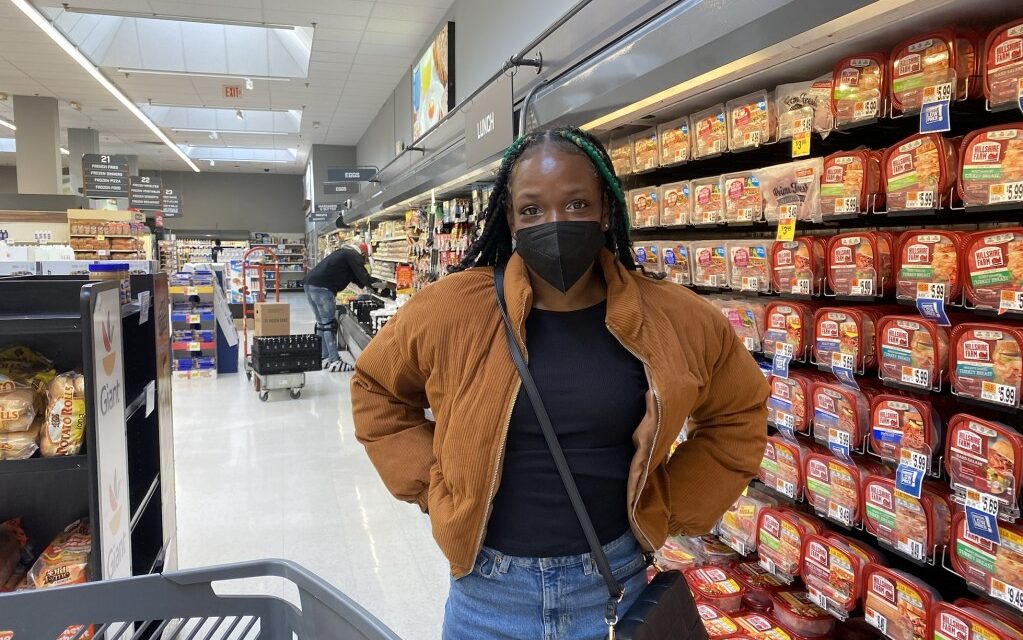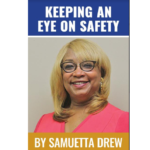By Adriana Navarro,
Special to the AFRO
Ward 8 residents are concerned that retail theft is threatening the survival of the area’s only grocery store, a Giant located at 1535 Alabama Ave. in Southeast, D.C.
Across the country, major companies like Target are combatting retail theft by taking their businesses elsewhere.
“I will get mad if they do decide to close the Giant down,” said Carolyn Miller, 32, who lives in Ward 8, “They definitely have great stuff here.”
As someone with five kids, Giant is convenient because it is close to her home and she said she could find good deals. Safeway, the next-closest grocery store, is more than a mile away. It is about a seven-minute drive from Giant by car or 12-minute bus ride.
Giant declined to interview, but assured there were currently no “current plans” to close the location in a statement to the AFRO.
However, Miller’s heard at least three times that the store could close – at least once from a Giant employee while inside of the store. If Giant was unavailable to her, Miller said she would likely go to Costco or Walmart, both of which are over a 20-minute drive away.
This push to close grocery stores arises after repeated retail theft and lost profits from corporations like Giant, Safeway and others.
The uptick has prompted many stores to stop stocking certain shelves, requiring customers to ask management for products.
One aisle of the CVS at the corner of the District’s Rhode Island Avenue featured empty shelves where customers could previously pick up toilet paper. There was no shortage, nor was the store sold out. A paper sign taped to a shelf tag explained that all paper products had been taken off the shelves due to theft.
Target made national headlines at the end of October when it shuttered nine stores across four states due to theft and organized retail crime. The company did not respond to multiple requests for a comment.
“We need to be able to run our stores safely and profitably. The reality is that theft and violence at this store is significant, and getting worse, not better. As a result, it is becoming increasingly more difficult to operate under these conditions,” read the statement provided by Giant Food Communications and Community Relations Manager Jonathan Arons. “We have invested a host of measures to mitigate the issue at this store, and across many stores, but we also need the help and partnership from the community and local officials to truly combat the theft and violence that continues to escalate.”

Over half of the District’s food deserts are in Ward 8, according to a 2017 report by the D.C. Policy Center. These are areas that are located more than half a mile from a grocery store or supermarket, have low rates of car access and have a high poverty rate.
“There are some food desert issues that are cropping up in jurisdictions that fought for years to try and get grocery stores in their districts and finally got them. But now they’re about to go under potentially because of this,” U.S. Rep. Glenn Ivey said at a press conference at Capitol Hill on Oct. 26.
Dozens of retailers joined the National Retail Federation to press Congress to pass a bill that its backers say will curb organized retail theft. Before the groups met in the Capitol, they gathered for an outdoor press conference where members of both political parties pledged their support.
“The bill, dubbed the Combating Organized Retail Crime Act of 2023, would allow for more involvement from the federal government and give resources to federal, state and local law enforcement agencies to coordinate across states,” said Matthew Shay, NRF president and CEO. “This was a step that Ivey stated would help law enforcement should perpetrators cross jurisdictional lines.”
“Even when I was the state’s attorney here, people would try to use the jurisdictional lines against us,” he said. “They would steal something in Maryland and try to take it into Virginia or D.C., knowing that law enforcement might get caught up by the jurisdictional change. Having federal involvement in coverage, that helps to make sure that we don’t get lost based on state jurisdictional lines.”
A survey by the retail trade association and lobbyist group found that national inventory loss in 2022 accounted for $112.1 billion in losses, 36 percent of which was made up by external theft, including organized retail crime-related events. The same survey also showed that while inventory shrink increased from 1.4 percent to 1.6 percent between 2021-2022, those numbers remained largely in line with figures from 2019 and 2020.
These percentages vary per retail sector, however, according to the study, with grocery stores and stores with mass merchandise seeing an average shrink rate of over 2 percent.
Both CVS Health and Target are listed as two of the registered to lobby this bill, according to OpenSecrets, a government transparency tracking nonprofit group.
McBride stated his confidence that the bill would be passed with bipartisan support.
“We are very confident. It is about a 50-50 split in a truly bipartisan legislation that we have on both sides, but we know that passing a law takes a lot of work,” he said. “So it’s going to take more work from us to continue to tell our stories, to introduce lawmakers to what the real world implications are happening in their constituencies.”
In August, Councilmember Trayon White (D-Md.-Ward 8) spoke on the detriment of retail theft in food deserts.
“We have one grocery store for 80,000 people while other wards have seven,” said White. “Seventy-five percent of people don’t have cars. For some people, it takes one hour to get to the grocery store. I am standing in solidarity with others to keep the Giant.”
“You don’t have to steal out of the grocery store. Taking from the store is taking from yourself,” White continued. “We know it’s tough times and we know the price of food has skyrocketed in the last three years. But we cannot afford to hurt ourselves by constantly taking from the store, because that means everybody is going to be without a place to eat, and enough is enough.”
Adriana Navarro is an intern from the University of Maryland College Park.
The post Ward 8 residents express concern about effects of retail theft in food deserts appeared first on AFRO American Newspapers .











